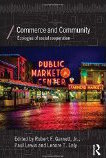Rethinking Philanthropy

A Radical Reform for Nonprofit Tax Exemption: A Thought Experiment
What is needed is a new consideration of the effect of tax exemption on the status of American philanthropy.

Giving and Human Excellence: The Paradigm of Liberal Philanthropy
The prevailing view today neglects what is ultimately philanthropy’s most important mission: enabling as many people as possible to participate in philanthropic activity.
Philanthropy, Economy, and Human Betterment: A Conversation with Kenneth Boulding
The consensus among economists today, and indeed since Adam Smith, is that philanthropy plays no essential role in the formal theory or institutional structure of a complex, decentralized economy.
The Transformation of Philanthropy: Causes, Processes, and Foreseeable Results
Philanthropy is undergoing a classic paradigm shift—a particular kind of historical change, which has a usefully intelligible character and direction. The generic phenomenon was identified by Thomas Kuhn, in The Structure of Scientific Revolutions (Chicago, 1962), and was readily applied in other fields of historical scholarship, especially to describe revolutionary change. More broadly applied, it refers to the total transformation of a mature field of human endeavor—“mature” in the sense of fully and coherently organized in its conceptualization, methodology, technology, and demographics, and fitting into its broader historical milieu, including technology, economy, societal infrastructure, cultural norms, and institutions.
Empowering, Not Enfeebling: Beyond the ‘Market V. State’ Dichotomy
The very core of philanthropy is the desire to do something, and rightly so. But sometimes we need to pull back and let individuals work to form their own associations, based on their own goals and taking advantage of their dispersed knowledge and diverse talents.
By “Simply Staying Possesses All”: Must Freedom and Limits be Opposed?
The beauty of Frost’s meditation on the relationship of freedom and limits is that it reflects how the soul should be disposed toward the Divine.

Why State-Led Humanitarian Action Fails
Foreign aid intended to alleviate poverty has largely failed and, still worse, in many cases caused additional harms to those who were already suffering.



Serendipity







How Does Technology Enhance or Diminish Our Capacity for Human Flourishing?
How does technology, and the attention it requires, enhance or diminish our capacity for creativity, community, and ultimately human flourishing?




